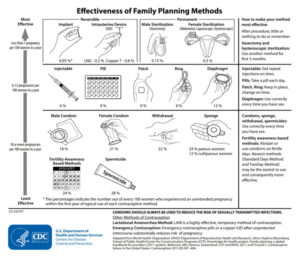
Contraception can be one of the most stressful things to think about. There are so many different options out there that it’s super easy to get overwhelmed. Pill, patch, IUD… What is the best option for you? Read below to find out 7 things that are super important to consider before talking to your doctor about contraception.
- Are you looking for the most effective method of contraception?
There are a number of options available out there, but not all contraception is made the same. Typical use vs perfect use is a concept that is super important to consider when choosing your contraception.
Perfect use is when a contraceptive method is used exactly as it was designed to be used. Typical use is what happens in real life and is the average usage pattern. Let’s use a condom as an example. Was the condom put on correctly? Are you using it every time you have sex? Did the condom break while you were using it? All of these contribute to the typical use rate of a condom.
When you compare the typical use rate to the perfect use rate, the difference is STAGGERING. Perfect use for condoms results in a 2% pregnancy rate. Typical use…18%! Compare this to hormonal IUD’s which have an identical typical and perfect use rate of 0.05%. It’s clear from these numbers that not all contraception is made the same, so make sure to consider effectiveness in your choice of contraception.
Most effective: surgical options (ex: tubal ligation), IUD, contraceptive implants
Effective: OCP, patch, injectables, vaginal ring
Least effective: condoms, cervical caps, diaphragms, sponges, spermicides, periodic abstinence, withdrawal

- Do you want something to take everyday or do you want something that you never have to think about?
Each contraception option has a different frequency of use rate. Condoms need to be used each and every time you have sex. The pill must be taken everyday, whereas the IUD is inserted and remains in place for 3-10 years. Think about your lifestyle and what option is the most realistic for you.
- Do you have a medical condition that may benefit from one type of contraception method over another?
Contraception is often used as the standard of care for a number of medical concerns. For example, women who have heavy bleeding can benefit from hormone containing IUDs as they thin out the uterine lining and result in lighter periods. 1 in 8 women in the US have PCOS, and both the pill and the hormonal IUD can be helpful in thinning out the uterine lining and reducing the risk of cancer in these women. Always make sure to share your entire medical history with your doctor and figure out the option that’s best for you.
- Are you at high risk for STI’s?
Remember that there are only a few contraception methods out there that protect against STI’s. If you are at high risk, it is recommended that you use condoms every time that you have oral, anal, or vaginal sex to protect yourself from STI’s.
- What are the side effects?
There are risks and side effects associated with some contraceptive methods. It’s important to consider what side effects are tolerable and which are absolute no-no’s for you. Common side effects of systemic hormonal options (ex: pill, patch) are bloating, nausea, and breast tenderness, but these tend to go away after a few months. Some women also experience breakthrough bleeding between periods.
- Do you have insurance coverage?
Each method is associated with a different cost. While the IUD has a steep upfront cost, it is a one time expenditure. Pills, patches, condoms (and other barrier methods), and rings each have recurring costs. If you have insurance coverage, check to see what is covered under your plan. Some plans will cover pills, but not IUDs and so you may be out of pocket if the IUD is the best option for you. Don’t forget that if you live in America you will also have to factor in the cost of doctor’s visits.
- Do you want to get pregnant in the near future?
Some contraceptive options have been associated with a delayed return to fertility. It’s important to let your doctor know if you are looking to get pregnant in the near future as this may change what options are available to you
Check out the following websites with reliable info if you want to do some more research.
These are just a few things to consider when you want to start contraception. Remember that what works for your friends may not work for you. Of course, always talk to your doctor. Make sure to ask lots of questions and always make the decision that will be best for you
Photo via Unsplash



















Thanks for this article. very useful
Glad you liked it! Let me know if there are other health topics you’re interested in learning about
That is good to know that every contraception option has a different frequency rate of use. I have been wanting to get a contraception option, but I have no idea what one to pick. That is a good idea to think about my lifestyle and see what option would be more realistic for me. I will have to really think hard about it.
This is a very nice artile, Birth control is good, but ask ask questions first
wonderful article about birth control. i will book mark this page.
These are some pretty good questions, especially the one about side effects. After all, considering how many different kinds of birth control are out there, you want to make sure that you’re choosing the right one for you. One of the smarter ideas might be to talk to your doctor about it and ask what kind of birth control they think is right for you.
Very useful…thank you very much.
I love this post…..very useful.
These are some pretty good questions, especially the one about side effects. After all, considering how many different kinds of birth control are out there, you want to make sure that you’re choosing the right one for you.
this is a nice article, keep it up
South african gqom songs
Nice post thanks for sharing
dopest one thans
Thanks for sharing this.